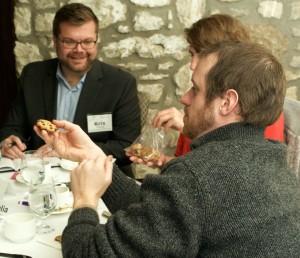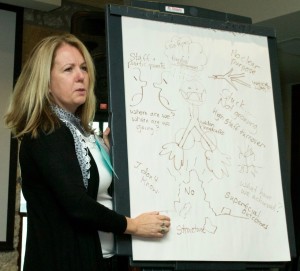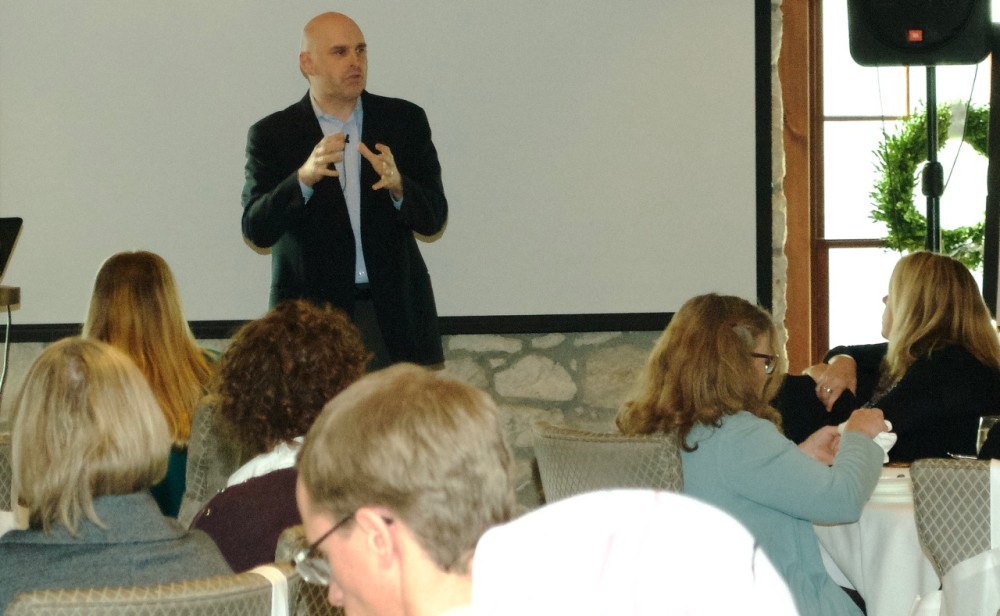|
Getting your Trinity Audio player ready...
|

So, how does a cookie crumble, and what does that have to do with building stronger non-profits that do great community work?
About 40 people are spending a day and half (Nov. 24-25) finding out. Not that they’re experimenting with dough mixtures and baking techniques; the nuances of cookies were simply an easy-to-digest way of tackling a tough subject — evaluation.
“When you invest time in it, it opens whole new ways of thinking in your organization,” Tanya Darisi said as Capacity Canada’s inaugural EvalU program got under way in Cambridge.
Sponsored by the Ontario Ministry of Citizenship, Immigration and International Trade, EvalU goes on the road next year, starting with a stop in Kingston, Jan. 26-27. Darisi, Megan Conway and Geetha Van den Daele are on Capacity’s EvalU team, as are Lisa Watson and Julia Coburn.
Evaluation used to be something charitable non-profits did to pitch numbers of interest to funders, often just before a program ran out of gas. It was basically a report card.

But Capacity teaches evaluation as an ongoing process — a kind of systems diagnostic that’s always running. Built into the culture of an organization, evaluation catches small problems before they get bigger.
Moreover, it becomes a tool for learning and adapting quickly. It allows non-profits to — what’s the word you hear more and more in the sector these days? — innovate.
“Learning isn’t something that happens after an evaluation,” said Van den Daele. “It’s going on every single step of the way.”
First, organizations have to get into an evaluation frame of mind, which is where the cookies took the group on day one.
Each table had samples of three different chocolate chip cookies. Participants evaluated the cookies on such things as taste and texture. Some people counted the chocolate chips in each sample.
Even the process underwent an evaluation: Were all participants heard? Were the evaluations of some considered worthier than those of others?
The point is organizations taking on evaluation should make it democratic, engaging all employees, as well as the leadership. And evaluation should look at things from multiple angles.
Client satisfaction, for example, shouldn’t be a program’s only measure of success. That outlook is stagnant and way overdue for a rethink.
Since evaluation is a weighty culture shift, it needs to rest on a solid foundation. The EvalU team spent the afternoon helping the group understand theory of change, so organizations can map out the things they want to improve, directions they want to go and risks they want to take.
Participants went into that session with a bit of a pep talk about innovation. Try it, said Tim Jackson, the day’s keynote speaker. And take risk-averse funders along.

“Innovation that happens in the non-profit sector is just as important as innovation in the for-profit sector,” said Jackson, lead executive at the MaRS Centre for Impact Investing. (He was also Capacity Canada’s first board chair.) “Along the way, you have to fail in order to innovate.”
Jackson said he’s frustrated by business executives who volunteer for non-profit boards, then check their passion for innovation at the door. They expect non-profits to operate within narrow boundaries.
“The path for transformational change,” he said, “is not a straight line.”
EvalU continues today (Nov. 25), diving deeper into the challenges and strategies of evaluative thinking

